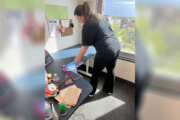WASHINGTON — Georgetown University officials are taking steps to educate the school community on the warning signs of meningitis, just one day after a student apparently died from the disease.
Andrea Jaime, a 19-year-old sophomore, died Tuesday at the MedStar Georgetown University Hospital. Before her death, the Florida native tweeted that she thought she was dying.
“Our thoughts and prayers are with Andrea’s family, friends and everyone in our Georgetown family during this difficult time,” Georgetown University doctor James Welsh wrote in a letter sent Wednesday. “All students who may be coping with this news and feelings of sorrow and grief are encouraged to use the services provided to all members of our university community.”
Meningitis is caused by an inflammation of the membranes near the brain and spinal cord. It might develop in response to a number of causes — usually bacteria or viruses — but meningitis is also caused by physical injury, cancer or certain drugs.
“We are still waiting for final test results that will show whether this was a case of bacterial meningitis,” Welsh wrote. “To date, all test results in this case are negative for bacterial meningitis. Each day that passes without positive bacterial growth in the tests further decreases the likelihood that this was a case of bacterial meningitis.”
This case was isolated; no other cases have been reported, Welsh continued. At this time, it’s not necessary for students, faculty and staff to take antibiotics for prevention.
Instead, school members should take extra steps to wash their hands with soap and water and use alcohol-based hand sanitizers more regularly.
“To further limit the spread of many illnesses, you should also avoid sharing cups, cosmetics, toothbrushes, smoking materials or anything that comes in contact with the mouth,” Welsh wrote.
Students who experience symptoms — sudden fever, headache and a stiff neck — should visit the Student Health Center or call 202-687-2200 during business hours. If after hours, students should call 202-444-7243 and ask for the clinician.
Follow @WTOP on Twitter and WTOP on Facebook.







